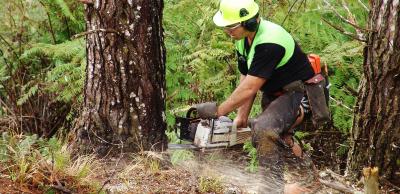The Guides are a joint venture between the forest sector and MPI and were initiated as part of the implementation of the National Environmental Standards for Plantation Forestry (NES-PF) which came into force on 1 May.
The NES-PF – a set of nationally applied rules and conditions for plantation forestry was developed to better protect the environment while also increasing operational certainty for foresters. The NES-PF was designed to provide rule consistency for forestry across the county.
The Forest Practice Guides will help industry and councils by providing standard practice guidance to include in management plans as part of requirements under the NES-PF. The guides will be especially useful for smaller companies with less specialist in-house expertise because the information is standardised to enable the forest industry to meet the NES-PF rules and conditions.
The FOA President, Peter Weir Chair says the guides will help contractors and forest managers implement best practice across all regions.
“They’re freely available and will direct forest owners and managers to other resources and technical specifications. The aim of the guides is to provide clear direction on best practice, and to be inserted into harvest plans so the resources are standardised and easily accessible.”
The Guides offer forest owners and managers guidance in a number of areas of forest operations:
- Earthworks and construction (including planning and design)
- Erosion and sediment control measures
- Construction of river/stream crossings
- Construction of tracks
- Vegetation measures to manage erosion
- Slash management
The Guides take information from earlier work completed by FOA and update it with reference to the new regulations, and to reflect the changing and improving practices of forest operations. They have some technical specifications and detail and link to other documents to ensure regulatory requirements are met.
The Guides themselves are not regulatory, but can be used as references in management plans. When used in this way, the Guides will support part of the compliance obligations under the Resource Management Act. Foresters will still need to work closely with contractors and regional councils to ensure compliance.
The Guides have been updated with content provided by forest managers who have on the ground practical experience in what works and what is considered best practice in the industry nationally.
The Guides have been developed with support from MPI and will be owned by FOA, FFA and Forest Industry Contractors Association. The Guides will be updated regularly as practices change and improve.
“The FOA/FFA Committee has drawn on a number of resources and their own experiences with what works in the field to provide guidance on the aspects of forestry operations which have the potential to cause environmental effects. For example, road and track construction needs to be well planned and designed to avoid sediment ending up in waterways,” Peter Weir says.
To download the guides please visit https://docs.nzfoa.org.nz/forest-practice-guides/
Contact Venise Comfort at This email address is being protected from spambots. You need JavaScript enabled to view it. for any queries about the guides.
